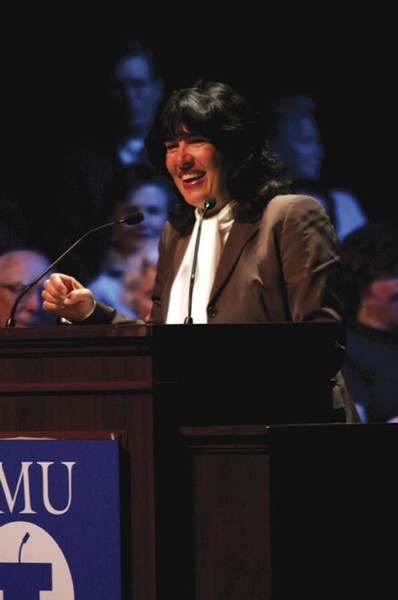
CNN correspondent talks about Iran, war in Iraq (Photo by John Schreiber, The Daily Campus)
“I’m a dinner jacket.” Saying this phrase as quickly as possible eventually articulates the president of Iran’s name, Mahmoud Ahmadinejad.
According to Christiane Amanpour, CNN’s chief international correspondent based in London, this is precisely how one goes about warming up an audience. But with a jam-packed McFarlin Auditorium and a journalist who doesn’t necessarily cover the happiest of world issues, one may realize the utter importance of cracking a joke before plummeting into topics of politics and war.
Amanpour, who has most recently reported on the death of Pope John Paul II and the election of Pope Benedict XVI, paid a visit to SMU Tuesday night as a part of the Tate Lecture Series. It was the first time the CNN reporter had been to Dallas since 1984 at the Republican National Convention.
After being introduced by President Turner, the speech began with a reiteration of Amanpour’s gratitude for her most warm and affable welcome to North Texas.
She briefly described growing up in Iran and how an immense portion of her life had been devoted to the country. Her preface paved the way for her commentary regarding Iran’s current nuclear proliferation program.
As the Iranian government takes steps toward developing enriched uranium, Amanpour believes that with the general consensus of the “European Three” (France, Germany and Great Britain) and the United States, nuclear weapons will be in possession of Iran within five to 10 years.
She disregarded some proposed tactics in dealing with what some consider a worry to the world as simply “not viable.” Amanpour thinks that such solutions included U.S. military action, U.N. sanctions and sheer hope for a revolution to overthrow the government.
Amanpour stressed her strong feeling that the only way to fully eradicate the threat Iran poses for the long-term is through engagement of diplomacy and societal interactions with Americans and Iranians.
The next major topic covered in the lecture was Iraq and the U.S. involvements in the War on Terror. Amanpour believes that the war is at a “precarious point” that is undoubtedly “on the edge” of potentially becoming an impossible mess. She further thinks that the war will take a “huge effort to bring back to progress.” Before wrapping up the topic, she emphasized her hope that a troop withdrawal will “not happen just yet.”
The speech went on to cover other political issues, such as the Israeli-Palestinian conflict, but the most imperative discussion — in the opinion of many who attended — came right before the question and answer session when Amanpour stressed the importance of journalism in today’s society.
She noted that the quality of journalism is rapidly declining and that her reporting is not in the business of spinning, slandering and withholding information.
Amanpour is an advocate of “truth and responsible journalism: informed and intellectual debate” without the presence of ideologues.
Amanpour emphasized that journalists are the messengers that deliver the news and information, and she understands that her “historic role is to report the important world to an important audience.”
The Tate Lecture Series continues next year with featured guests: ABC News anchor Ted Koppel, CNN commentator Anderson Cooper, the author of “Blink,” Malcolm Gladwell, and “Freakenomics” co-author Steven D. Levitt.








